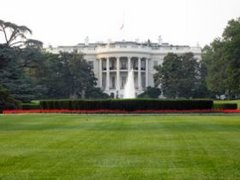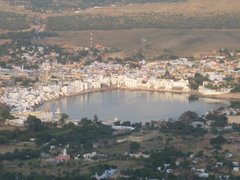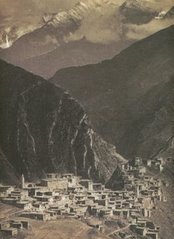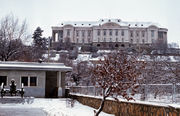The most iconic visual image of a Chinese protester, still frozen in memory in recent decades: a single unarmed Youngster standing defiantly in front of four tanks, daring them to run him over.
The revolt in Tunisia was sparked by the suicide attempt of an unemployed 26 years old graduate, Mohamed Bouazizi, a road side vendor, who patience snapped after the police took away his cart, the sole means of livelihood. An event which could have gone unnoticed before, aided by technology, ignited the desperate people.
The leaping flames of freedom are now spreading across the region and beyond. Despots and dictators sitting on top of brutal regimes, billions of dollars, bevies of mistresses and fawning courtiers are increasingly getting nervous. But the impatient masses are seized of their new found freedom and dreaming for long desired changes.
People at large are delighted by 24x7 internet access and ability to share reactions to the world at large. With each technological leap forward, barriers fall, dictators’ control lessens, ignorance decreases and people can take ever more informed actions. And that is the real good news for widely desired freedom and openness.
During April 1989, angry students in China converged on Beijing’s vast Tienanmen Square. More than 100,000 assembled to mourn death of a liberal, pro-democracy communist party member Hu Yobang. The demonstrations spread to other cities, turned in to dreaded pro democracy movement and lasted about seven weeks. Communist Party hardliners were divided and worried as the public support grew across the world, for the movement aided by modern technology. Eventually they ordered the Army to clear the square, but Soldiers faced substantial resistance from people.
On the night of 4th of June, 1989, People’s Liberation Army with tanks circled the peaceful demonstrators and opened fire; they had to meet an early morning deadline, to clear the square. Exact numbers were never known, but more than 3000 demonstrators believed to have died, dreaming for democracy. The Chinese government had blocked TV and radio but missed the new communications technology called the fax machine. These machines kept churning out images of repression, bravery and words of support from across the world.
The mighty Berlin wall was eventually pulled down by people in November, 1989, by emotive forces unleashed through the images of satellite television, delivering a final crushing blow to weakened entity of the draconian communist regimes.
The misty eyed bands of die hard communists, across the world, still go through rituals of yearly breast beating by bemoaning the hated fall of their beloved wall by devious capitalistic mechanization, while strongly justifying killing of young counter reactionaries in Tienanmen Square.
Technology has stuck again in North Africa and Middle East, after 22 years of those tumultuous events of 1989.
Youthful emotive forces unleashed by expanding internet and vibrant social media, made a despot in Tunisia flee. With in days, the seismic waves traveled east, by passing 40 years old Col. Gaddafi regime of Libya and in no time the decades old dormant anger in Egypt exploded. The Tahrir Square in Cairo got filled with men and women seized of deep desires to change their lives or even die in their pursuits. Young men and women, students, professors, artists, housewives and kids, Muslims and Copt Christians fought and celebrated together in the large square. They valiantly resisted and suffered violent onslaughts by thugs riding speeding trucks, horses and camels, leaving about 11 dead and many grievously injured.
The Egypt effect, signifying crumbling of a well entrenched despotic empire, has encouraged people in the Middle East and Main land China. Demonstrations have been growing in Algeria, Jordan, Yemen, Morocco, Kuwait and Bahrain. The nervous rulers of Syria have already made some relaxations to placate the people.
The bearded Mullahs heading theocratic regime in Iran have been gleefully watching the events in Cairo with a different perspective-a kind of heady replication of Iranian revolution leading to a theocratic state. For the Iranian opposition, which has been absent on the streets in more than a year, seems to ready to reassert its presence after facing relentless oppressions. Tens of thousands of protesters assembled and clashed with security forces on Tehran’s main boulevards, which were immediately shrouded in clouds of tear gas, leaving one civilian was dead.
Iranian theocratic regime has detained the son of opposition leader Mehdi Karrubi. He was arrested after security forces raided his home. Many members of the Iranian parliament issued death threads against the opposition leaders and former presidential candidates. Some have been wildly chanting “execute Moussavi, Karrubi."
Let us try to dispassionately go over the past and present to conjure up a possible vision of future.
In Egypt, the top commanders, all with strong political ties to age old Mubarak regime, must have decided to break with him for the sake of their own legitimacy. But they still have a vital stake in maintaining the status quo, not just politically, but economically as well. Egyptian authorities have frozen assets of Hosni Mubarak and his family. Some ministers have come under corruption investigation in Egypt, but how far and wide spread these actions would go, is still to be seen.
In a well entrenched crony capitalism alliances forged through decades , Egyptian military officers own shares in just every industry and businesses in the country, from construction to automobiles companies to the cash cow- tourism.
The scenario holds true for most of the countries in the region. This could eventually lead to a serious clash during expected arbitration trying to bring an end to corruption and related trials.
According to some Middle East watchers-"To even think about the investigation of the transgressions of the regime has to take it directly into the military economy, as military leaders have less than zero interest in having an investigation of that."
Egypt is in the early stages of a leadership succession that could possibly swing the country toward greater openness and political competition or even towards the often dreaded consolidated authoritarianism. The military command has proposed extensive constitutional amendments that would shift some powers to the legislative branch and revise rules for presidential and parliamentary elections, but observers are concerned that many of the changes may prove to be cosmetic.
Crises in Iraq, Palestine, and Lebanon have hindered the democracy promotion, yet these developments present a unique opportunity to urge meaningful reform in Egypt, perhaps without endangering stability and key regional relationships. In such a welcome eventuality, the waves of democratic reforms would unfold with diverse out come, elsewhere in the region and beyond.
The major implications of Egypt’s current political climate and presents four key issues: presidential term limits, greater freedom for political parties and movements, independent election oversight, and limiting executive powers.
For a long time in the Arab world, Islamists have assumed the role once played by national liberation movements and the leftist. They are deeply embedded in the social fabric, and are thus able to mobilize considerable influence. Their ideology prescribes a very simple and easily understood solution to the persistent crises of contemporary Arab societies—a return to the fundamentals, or the true spirit of Islam.
Indeed, “Islam is the solution” has been the longtime slogan of Egypt’s Muslim Brotherhood and others. Islamists have been able to distill and promote for long, a complex philosophical tradition into simple slogans that have quickly supplanted the Pan-Arabism and socialism that dominated the region until the 1970s. As a result, in most countries in the region; the Islamists represent the only viable opposition forces to existing undemocratic regimes, till now.
Islamic thinkers like Hasan Al Bana and Sayed Qutab of Muslim brotherhood along with Syed Abdul Ala Maddudi of Jammat Islami of Pakistan had laid foundation stone of hereto visible fissile shade of religious fanaticism. Al Azhar University of Cairo too had espoused the similar strains of Islam. The well known Amir of Jihad Abdullah Azzam was an Al Azhar scholar and guru of Osama Bin Laden.
But now, the incorrigible optimists have few good reasons to believe that the Egypt effect has created ripples of unstoppable waves to rewrite the future of democracies and individual freedom in the Middle East. A keen regional analyst has echoed his enthusiastic sentiments, “Each place will interpret the fallout from Egypt in their own way and in their own context.’’
The seismic waves, which had bypassed Libya in January has bounced back with greater force.
Brutal Gaddafi has reacted predictably, by ordering his air force to fire on the foreign inspired “Rats” swarming out on roads. His bald Mafiosi resembling son Saif Gaddafi has threatened to unleash rivers of blood and fight to last bullet. How many people have died there, is still not clear, but death toll seems to be mounting, as unrest spreads widely. Libyan Ministers and diplomats are resigning and distancing themselves from the mad regime. Several opposition groups in exile called for the overthrow of Gaddafi and for a peaceful transition of power in Libya.
But stark differences exist between worldly, commercially integrated Egypt and definably insular Libya. There are no well entrenched bureaucratic and administrative structures in Libya, which has been ruled by groups of armed thugs and tribes loyal to Gaddafi. The isolation and suppression of Libyan people is formidable and unimaginable, according to experts.
Now, as protests are growing widely in Middle East, a key question is if the Chinese communists dread it surfacing again in their own country?
The economic power house of China has stark similarities to Tunisia and Egypt.
First similarity, the Chinese regime is not democratically elected and rules only by brutal force.
Second, the food inflation is soaring. According to official data, food prices soared about 10 percent from the previous year in December 2010 and jumped 12 percent in November 2010. Many economists believe these figures are rigged and inflation is actually much higher.
Third, the growing discontent over low wages had been gradually manifested in a string of migrant worker suicides in Guangdong. The suicides prompted worker strikes, which were resolved after factory owners gave sizable wage concessions.
The 1989 protests were politically motivated. After the uprising was crushed brutally, people consented to the communist rule, all these years because of unfolding economic development.
Now, for the first time in 22 years, university graduates, even from prestigious ones, had trouble finding gainful employment. They are called 'ant tribes'. The vile term loosely lampoons and describes- growing army of educated young Chinese people forced to bear sordid living conditions in Beijing, Shanghai and elsewhere.
The fate of migrant workers remains greatly oppressed, as the soaring food prices during 2010 have affected them brutally.
If, the hereto suppressed “Jasmine” unrest were to rebound and grow lethal in China, later during 2011, it would be predominantly based on economic disparities as opposed to political discontent of 1989.
Monday, August 8, 2011
Subscribe to:
Post Comments (Atom)




















No comments:
Post a Comment